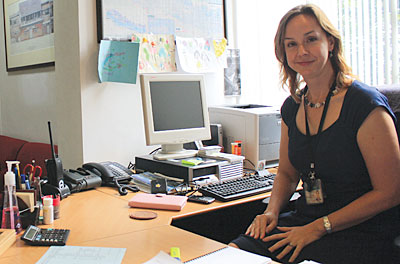Nepali Times: Looking back on the past three years of your tenure here, would you say the politics has got in the way of development? 
Sarah Sanyahumbi: Clearly a government which is primarily occupied with politics has little time for development and that means, sadly, that there has been little leadership or support for development in the time that I've been here. I take my hat off to the dedicated government officials who are trying against the odds to deliver services and improve poor people's lives, but with an at best indifferent and at worst increasingly politicised leadership this is more and more difficult.
And yet DFID has raised its disbursement in Nepal.
DFID is used to working in challenging countries. Whatever the political situation, the fact remains that over 55 per cent of people in Nepal live on less than $1.25 a day and face huge hardships. In the next four years we will provide over 500 km more roads, 230,000 jobs and provide 110,000 safe latrines. We will also work with the government to improve the provision of health and education and to reduce people's vulnerability to disasters. We estimate that we can lift approximately 570,000 people out of poverty, make their lives better and give them more hope for the future. That's really what it's all about.
Which segment of DFID's area of activity would you say has achieved most bang for the buck, as it were?
You can't really compare like with like. Our experience with our Livelihoods and Forestry program, for example, shows that we have lifted people out of poverty for a cost of around £35 per person. That's fantastic value for money, but it wouldn't make sense to do just forestry in Nepal. We deliberately have a broad program so that we can tackle different aspects of poverty, which are all inter-related. There is no point in providing health care or education if people can't get to it because there is no road, or they are too weak through malnutrition, or because the children have to work to earn money. So we have to work on all these issues together to really make a difference.
There has been criticism that donor money has gone to fund quasi-political groups espousing violence?
We absolutely do not! Despite very good experience with NEFIN over a number of years, once its activities became more political earlier this year and the leadership called a number of bandhs, which clearly use violence to enforce them, we stopped our funding. This was a difficult decision as the organisation has achieved a lot of good, particularly at the local level, over the past few years.
Where would you say the main challenges lie for your successor and for other donors in Nepal in the next five years?
Lots of challenges, but I'd single out two. Firstly, dealing with corruption. DFID has a zero tolerance policy to corruption, so this means we investigate every single allegation of corruption we receive. This takes time and money and means we have to be very careful who we fund and how. We have one full time member of staff who spends 75 percent of his time outside Kathmandu following up with programs and partners, making sure our money is being well spent, and investigating any such reports of corruption or mismanagement.
Secondly, safeguarding the amount of funding we put through government systems will be difficult. We fund the government's health and education programs, LGCDP and the Nepal Peace Trust Fund through government systems. But weak financial systems, political interference and a lack of interest in development on the part of the political parties makes it increasingly difficult to justify to our headquarters at home that this is the best use of our funds. The rationale behind funding through government, as well as increasing government ownership, is that it improves government systems, galvanises reform and ultimately improves service delivery. If we can't clearly see that happening, then our Ministers and the UK public will be right to ask if it's worth the increased risk and additional cost of doing so.
You are going on to Malawi from here, how do you think Nepal will compare?
Nepal has huge potential in hydropower, its position between India and China, it has tourism. It just needs the political will to exploit these advantages. Used correctly this could make a massive difference to poverty in Nepal. The private sector is trying, and so are some international donors, but it is almost criminal that Nepal's huge potential is not being used. There are countries like Malawi which would be very envious of the kind of resources that Nepal has.


